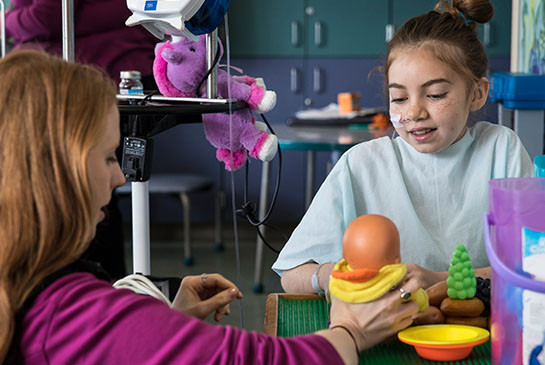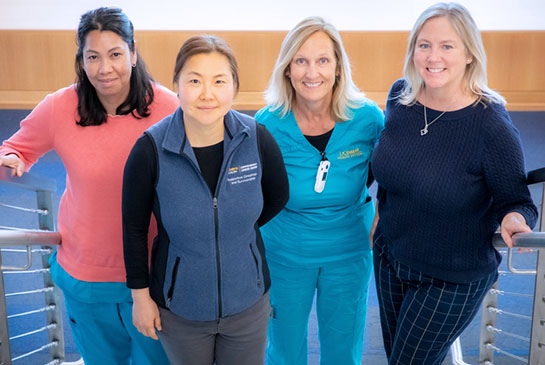Social Workers and Other Health Care Professionals
During your child’s hospital stay, you may rely upon the expertise of a variety of health care professionals including pediatric social workers, respiratory therapists, registered dietitians, physical therapists, speech-language pathologists, occupational therapists, pediatric-trained pharmacists, chaplains and discharge planners.
-
Medical Social Workers
Pediatric social services representatives are available to assist your child or your family in coping with hospitalization, providing referrals to community resources and special programs designed to meet your child’s needs. Please ask for your social worker or child’s nurse if you require support.
-
Respiratory Therapists
Respiratory therapists provide specialized care and support for children with conditions that may cause difficulty breathing (such as asthma, cardiopulmonary disease and certain neurological disorders) or those at risk of respiratory infection.
-
Registered Dietitians
A registered dietician will follow your child’s nutrition needs closely and develop a personalized nutrition plan for your child to support their recovery.
-
Inpatient Physical Therapists
Physical therapists working in the hospital teach patients mobility skills needed to become functionally independent. An individualized program is developed and discussed with each patient and with family members as appropriate. The plan includes a goals that are tailored to the strength and movement needs of the patient. Physical therapists help patients achieve these goals in a variety of ways including mat exercises, wheelchair instruction, and the use of parallel bars or other devices for gait training. The family is instructed in these techniques so that they will be prepared to help the patient achieve maximal independence at home and in the community.
-
Occupational Therapists
Occupational therapists assist patients in relearning a variety of daily activities, including eating, dressing, and personal hygiene. These activities are referred to as activities of daily living (ADL). Occupational therapists also help patients regain control and function of their arms and hands. Additionally, occupational therapist may assess the need for a wheelchair, specialized cushions, or other equipment that will allow patients to function safely and independently in the home and community environment.
-
Speech-Language Pathologists
Speech-language pathologists evaluate a patient’s communication, thinking processes, and swallowing abilities. Therapy provides patients with skills to improve their attention, memory, reasoning, and understanding of language and speaking, as well as helps patients eat and swallow safely. Therapy is individualized to meet a patient’s needs. Family education is an integral part of treatment. The goal of therapy is to help patients communicate effectively at home, in the community, and in the work or school setting.
-
Pediatric-Trained Pharmacists
Pediatric Pharmacy ServicesPharmacists in our hospital pharmacy are pediatric-trained to ensure that medications prescribed and dispensed to all pediatric patients are safe, effective, and in a form that is friendly for children (such as flavored liquids instead of tablets).
-
Chaplains
Call Pastoral CareSend emailSpiritual support may be an important part of your child’s recovery and provide comfort to you and your family. Our pastoral services are available as needed and offer culturally and spiritually appropriate care to all patients, staff and visitors, 24 hours a day, with dignity and respect.



